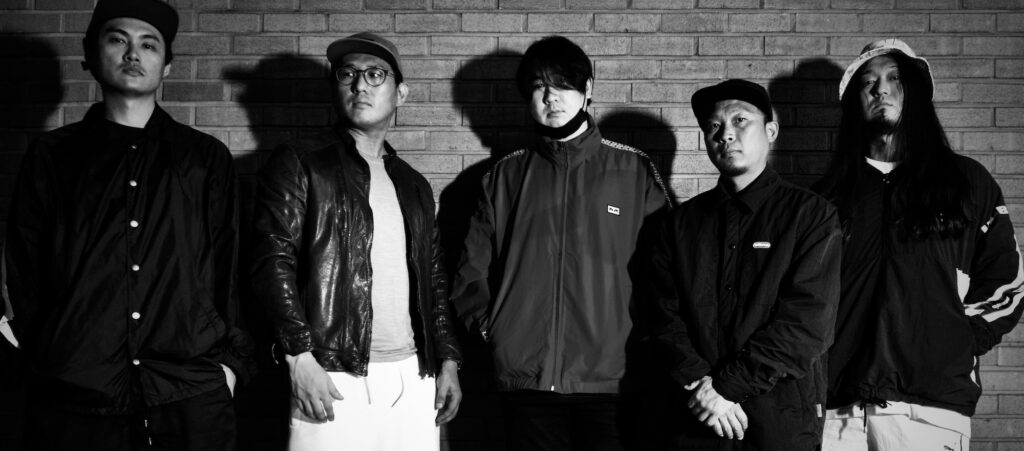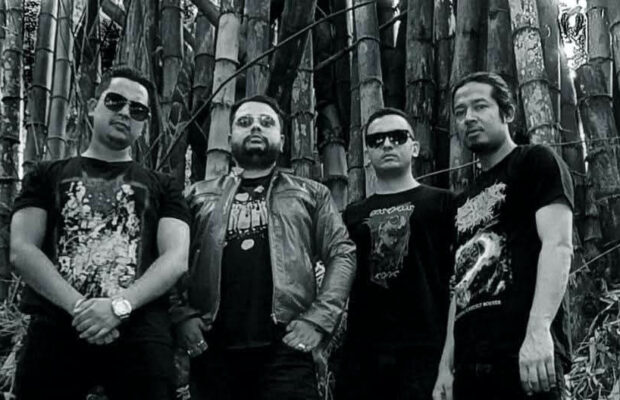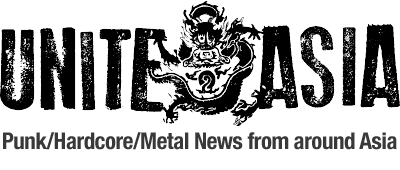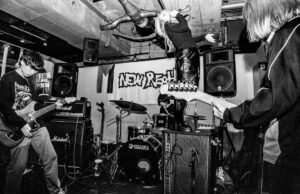Post Hardcore Band CHAIN REACTION Return With New Record ‘A Love Supreme’ [Korea]
By Unite Asia on April 4, 2025@uniteasia
We are SO thrilled that Korean post-hardcore band CHAIN REACTION has released a new album of heart-wrenching music and that they’ve sent us this INCREDIBLE write up documenting the band’s journey and their new record.
KAMSAMIDA!
Korean post-hardcore band CHAIN REACTION has continued a sparse yet deliberate trajectory, often revealing new songs through live performances rather than conventional releases. Their debut full-length album, Features/Creatures, was released five years after the band’s formation. Each of its 13 tracks runs under three minutes, yet the album resisted easy genre categorization. Instead of leaning into the genre’s usual hallmarks – concise, repetitive hooks or bold, muscular riff lines—Chain Reaction treated every sonic fragment as a narrative thread. Every sound converged or fragmented, not for immediacy or impact, but in service of a story. These compositions ultimately revealed a distinctive character that reached beyond intuitive impact or technical polish, asking the listener not just to absorb the clash of screams and noise, but to sit with it and reflect on it. Park Se-hoon’s vocals, though falling within the bounds of screaming, arrived unfiltered and unprocessed, prioritizing raw presence over sonic finesse. The band’s three guitars rejected flashy solos and the conventional divide between lead and rhythm, instead merging and scattering in irregular, unpredictable formations. Their lyrics, delivered primarily in Korean, presented emotional currents in fragmented, roundabout ways. At times this felt refreshing; at others, burdensome—especially when filtered through the familiar grammar of the genre. While it loosely aligned with post-hardcore, the album pushed itself beyond the genre’s well-worn listening rituals, as if urging itself toward somewhere undefined and distant.
Born out of five years of conflict, doubt, and perseverance, their debut album earned a nomination at the Korean Popular Music Awards and seemed to mark the beginning of a more active phase, with a growing string of performances. However, like countless other bands, they couldn’t outrun the rupture that followed in the wake of the pandemic. During the long hiatus that followed—marked by a change in bassist and a stalled writing process—they entered a period where it genuinely seemed possible they might stop altogether, just as many others had. At one point, they reappeared with shorter hair and a more put-together look, a shift that only emphasized how burdened and uncertain they seemed, fueling concerns that they were preparing to leave the project behind.
But rather than leave the battlefield, they chose to return—weathered, but resolute. With Features/Creatures, they had broken through genre conventions to carve out their musical identity; now, with their new album, they confronted that very identity as something to once again dismantle and move beyond. And so, after six years, they returned with A Love Supreme.
The title track and album name, A Love Supreme, feels unexpectedly out of place given the band’s usual sonic palette. But in that dissonance, it encapsulates the moments they’ve had to endure and overcome. For one, their approach to songwriting has become noticeably more flexible. Where they once leaned heavily on complex structures, constant variation, and irregular development—treating each instrument and track as raw material for a single, unified piece—they now show a willingness to loosen that framework. Overall, the early tracks of the album feel like a continuation of their previous work, but as it moves past the midpoint, new experiments begin to take up more space, creating the impression that the band’s attitude and output have evolved chronologically since Features/Creatures.
Starting with the opening track and pre-release single “Numb,” the band retains hardcore’s hallmark aggression and punchy brevity, but draws from a wide spectrum of rock history to shape their ideas. From the echo of ’80s hard rock to the grit of ’90s grunge and alternative, they incorporate a variety of riff tones and structural approaches. Yet rather than stitching them together as surface-level references, they achieve a genuine fusion—integrating these influences deeply enough that the listener can tangibly feel those genres operating within the hardcore framework. This shift becomes especially pronounced with the third track, “Buried Mind,” which opens with backing riffs rooted in Seattle grunge, then pulls the momentum of classic hard rock—amplified by propulsive basslines and overdriven tones—into a hardcore framework. As the album builds, “Empty Out” blends melodic hardcore–leaning riffs, piercing screams, and irregular transitions, evoking the energy of a live performance. “The Fault,” driven by riffs reminiscent of Pearl Jam or Alice in Chains, stands out for how it weaves together the seemingly incompatible languages of hardcore, hard rock, and alternative. It’s a synthesis achieved through the band’s signature layered arrangements and a more expansive, melodic sensibility.
The band’s vocal approach has also grown more varied to match the album’s increasingly melodic structures. Park Se-hoon’s vocals, which previously functioned more as narrative texture, now assert themselves more directly—interacting with the instrumentation rather than simply serving it. On this album, he navigates the space between singing and screaming in the lower register, adds layers of noise and effects to shift vocal placement, and builds harmonies before carrying the melody forward. If Yang Yun-ki’s solid, hard-hitting drumming continues to anchor the band’s sound and symbolize its throughline, then new bassist Hwang Ju-yeong embodies the broader range of change the band has embraced. With a background in blues and a signature style rooted in groovy slap bass, his playing brings greater control over pacing and dynamic flow to Chain Reaction’s traditionally volatile, unpredictable sound. The contrast in technique also adds a distinctive rhythmic texture—especially in faster tracks—working in tandem with Yang’s drumming to shape the album’s expanded low-end presence.
The three tracks following track seven, “Reprise,” mark a run of bold departures, showing the band confronting both genre conventions and their own perceived limits head-on. The rock ballad “Reprise,” driven by arpeggiated guitar tones, symbolizes a striking rupture from Chain Reaction’s identity as a hardcore band. Vocalist Park Se-hoon shows a level of expressiveness that goes beyond typical screaming—something he could just as well achieve through traditional singing. His phrasing and breath control, layered over the track’s hazy, subdued tone, are what ultimately take center stage in this track. At the same time, the composition itself is striking, juxtaposing melodic passages with fragmented riffs in a way that feels both deliberate and
unconventional. “Mirrors” follows—a track that reads like a tribute to bands such as Touché Amoré and Envy, longtime influences of the group. Then comes the album’s emotional and sonic apex: the 11-minute epic “A Love Supreme.” Undeniably the centerpiece of the record, it opens with a whirlwind of pounding instrumentation, screamed vocals, and densely layered melodic
guitars. The track barrels forward without pause for over three minutes before breaking into alternating passages of piercing guitar solos and screaming vocals. From the chorus section onward, it begins stripping away layers, leaving only the core musical elements. What emerges is a sense of intellectual tension, as detailed variations and shifting combinations of screams, choruses, and guitar lines push against the straightforward momentum of the first half. The third act, beginning around the six-minute mark, shifts the emotional tone entirely. Fuzzy guitar tones and a bluesy bass line slow the tempo as if the song is sinking inward, carving out a space for reflection. About a minute later, all these elements surge forward in a sweeping four-minute finale that brings the narrative to a cathartic close. Melodic choruses and screams trade off in sing along-like exchanges, while layers of guitar continue to build with unrelenting intensity. The lead guitar erupts with raw emotion, as if releasing everything held in. Meanwhile, the drums, having set aside their early momentum, hold steady beneath it all, and the bass fills in the low and midrange, flexing rhythmically to reinforce the finer emotional details. Everything converges with razor-sharp focus toward a single, explosive moment.
Spanning so-called ‘pimp rock’ a Korean term referring to groove-heavy crossover rock influenced by hip-hop, metal, and hardcore to alternative, hard rock, and even rock ballads, A Love Supreme unfolds with a broader sonic range than its predecessor. And in that range lies its resistance to easy classification—an even more unruly work than Features/Creatures when viewed through the lens of genre conventions. But that’s precisely what makes it significant: it sets its sights on a point no other band in the current scene has pursued or reached, and in doing so, marks a meaningful step forward. Once again, Chain Reaction has completed an album while quietly bearing the weight of genre literacy, reflection on the identity that has sustained them, and a clear sense of purpose behind what comes next.
It’s a strange and moving experience to finally encounter the result of nearly six quiet years of preparation from the members of TEAM BSPK—a group that, for the past nine years, had dedicated themselves to supporting others, completing and elevating someone else’s music from behind the scenes. As industry collaborators, they stood close to the spotlight without ever stepping into it themselves. That history alone makes their music compelling, but A Love Supreme clearly warrants more than just quiet admiration—it invites both recognition and debate. Whether you’re someone seeking new sonic stimulation, someone who values music steeped in reflection, or someone searching for meaning beyond just background noise, A Love Supreme offers more than what time spent listening might suggest. It marks a peak—one reached by a band that, over 11 years, simply never stopped moving forward.
Featured

Technical Brutal Death Metal CELESTIAL GORGE Release New Single [India]
Unite Asia | January 28, 2026After a significant hiatus, CELESTIAL GORGE is back with their first single from the upcoming album, releasing late 2026. Redemption is a cry for clarity amongst the noise of...
-
 Unite Asia | January 28, 2026
Unite Asia | January 28, 2026
-
Reviews
-
 Unite Asia | November 11, 2022
Unite Asia | November 11, 2022
REVIEW: Hong Kong Post-Hardcore Act Wellsaid Release Sophomore Album ‘Lurking’
-
 Unite Asia | April 3, 2022
Unite Asia | April 3, 2022
REVIEW: Hardcore Punk Act SPIT Release Self-Titled Debut Album [Taiwan]
-
 Unite Asia | August 31, 2021
Unite Asia | August 31, 2021
REVIEW: Melodic Death Metal Band Reborn Release EP [Vietnam]
-
 Unite Asia | August 4, 2021
Unite Asia | August 4, 2021
REVIEW: The Most Important Punk Rock Release of 2021 – The Rebel Riot [Myanmar]
-
 Unite Asia | June 15, 2021
Unite Asia | June 15, 2021
REVIEW: Metalcore Band Prompts’ ‘Magenta Smile’ Gets A Full Review [Japan]
-
Upcoming Releases
-
 Unite Asia | February 12, 2026
Unite Asia | February 12, 2026
-
 Unite Asia | January 30, 2026
Unite Asia | January 30, 2026
-
 Unite Asia | January 9, 2026
Unite Asia | January 9, 2026
Osaka Skramz – HOUSE OF THE BLOOD CHOIR – Release Debut Full Length [Japan]
-
 Unite Asia | January 7, 2026
Unite Asia | January 7, 2026
Chinese Melodic Hardcore Act SUCH GREAT HEIGHTS Finally Release Debut EP [China]
-
 Unite Asia | January 4, 2026
Unite Asia | January 4, 2026
Beatdown Band MONYBAG1327 Drop Final 3 Track Promo [Malaysia]
-
Facebook
Recent Posts
-
 Unite Asia | February 13, 2026
Unite Asia | February 13, 2026
Emo Band BEESWAX Return With New Single About Resilience [Indonesia]
-
 Unite Asia | February 12, 2026
Unite Asia | February 12, 2026
Brutal Deathgrind Band GUTSLIT Release Insane New Single [India]
-
 Unite Asia | February 12, 2026
Unite Asia | February 12, 2026
-
 Unite Asia | January 30, 2026
Unite Asia | January 30, 2026
-
 Unite Asia | January 28, 2026
Unite Asia | January 28, 2026
Technical Brutal Death Metal CELESTIAL GORGE Release New Single [India]
-
Sitemap
Latest Posts
-
 Unite Asia | February 13, 2026
Unite Asia | February 13, 2026
Emo Band BEESWAX Return With New Single About Resilience [Indonesia]
-
 Unite Asia | February 12, 2026
Unite Asia | February 12, 2026
Brutal Deathgrind Band GUTSLIT Release Insane New Single [India]
-
 Unite Asia | February 12, 2026
Unite Asia | February 12, 2026
-
 Unite Asia | January 30, 2026
Unite Asia | January 30, 2026
-
Categories
Featured hardcore Indonesia Japan Philippines metal female Malaysia hardcore punk Singapore metalcore Hong Kong punk rock Thailand pop punk punk China India death metal indie rock Korea grindcore emo Post hardcore black metal Taiwan Nepal melodic hardcore thrash metal metallic hardcore Vietnam post rock hardcore metal alt rock screamo beatdown deathcore post punk emotive punk shoegaze
Copyright © 2024 Unite Asia. Designed and powered by ALT-X Agency.




